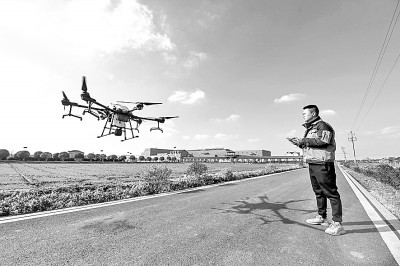How can the "oil" in the digital economy era generate more "power"
[Economic Interface]
Guangming Daily reporter Liu Kun Guangming Daily correspondent Yin Zeren
Scan the QR code to view the production information of clothing; New technologies such as big data and 5G are booming, making more and more factories more "smart" … … Nowadays, data has become the fifth largest factor of production after land, labor, capital and technology, and is inserting "digital wings" for production and life.
The Party Central Committee and the State Council recently issued the "Party and State Institutional Reform Plan", which clearly established the National Data Bureau, which is responsible for coordinating and promoting the construction of basic data systems, coordinating the integration, sharing, development and utilization of data resources, and coordinating and promoting the planning and construction of digital China, digital economy and digital society.
Data is called "oil" in the era of digital economy. What are the opportunities and challenges for the development of China’s big data industry at present and in the future? How to better play the role of data elements? The reporter conducted an interview on this.
The "family" of data resources is more solid.
Caring for the elderly living alone in the village, can the data "take the handle"? The answer is yes.
In Xiajiang Village, Fengshuling Town, Chun ‘an County, Hangzhou City, Zhejiang Province, the local power supply station collects electricity consumption data through smart meters in villagers’ homes to analyze the electricity consumption of elderly people living alone. If there is abnormal electricity consumption, they will send out early warning information in time, and relevant personnel will come to visit to avoid accidents. "The owners usually work outside the home and are not around the elderly. We can understand the work and rest of the elderly by monitoring the electricity consumption, which will also reassure the owners." Power supply staff said.
In fact, data not only brings more convenience to people’s lives, but also "shows its talents" in the production field.

5G digital pepper planting base in tiemen town, Xin ‘an County, Luoyang, Henan Province. Photo by Zhang Yixi/Bright Picture
In the digital workshop of a manufacturing enterprise in Guangdong Province, intelligent robots operate in an orderly manner, and all production data are displayed on the big screen of the office area in real time for managers to check and control. Compared with before, the production efficiency of the workshop has been greatly improved and the production cost has been greatly reduced … …
The industry believes that data is the "oil" in the era of digital economy. Data flow is like oil burning, which can generate power, while power brings value. For example, data flow can drive technology flow, material flow, talent flow and capital flow. Data is also a "diamond mine" in the era of digital economy, which can generate value through mining and refining. It is reflected in revealing the laws that a single data cannot show through multi-dimensional and multi-field data, realizing accurate decision-making, increasing certainty, traceability and predictability, reducing decision-making mistakes and reducing risks.
Experts say that big data industry, as a strategic emerging industry focusing on data generation, collection, storage, processing, analysis and service, is the key support to activate the potential of data elements. In recent years, China’s big data industry has risen rapidly and gradually developed into an advantageous industry supporting economic and social development. The data resources are more solid, the basic capabilities of data collection, transmission and storage have been significantly improved, and big data products and services have been widely popularized, especially in the prevention and control of epidemic situation and the resumption of production. It has played the role of "Depth Charge" and "main force".
The White Paper on Big Data (2022) issued by China Institute of Information and Communication shows that China’s big data industry has shown a good development trend and its innovation capability has been continuously enhanced. In 2021, the number of papers published in the field of big data in China accounted for 31% of the world, and the total number of patents related to big data accounted for over 50% of the world, ranking first; A number of big data leading enterprises have risen rapidly and their market prospects are widely recognized.
Yan Gang, deputy chairman of the Sichuan Provincial Committee of the Democratic National Construction Association, counselor of the Chengdu Municipal Government and dean of the Big Data Research Institute of Southwestern University of Finance and Economics, told reporters that at present, the development status of China’s big data industry can be summarized as "frequent policies, rapid development and great potential". In terms of policy, the benefits of "counting the east and calculating the west" continue; In terms of scale, China’s digital economy ranks second in the world for many years. In 2022, the scale of big data industry reached 1.57 trillion yuan, an increase of 18% year-on-year.
"China’s big data industry foundation is increasingly consolidated, the industrial chain is initially formed, and the ecosystem is continuously optimized. At present, it is in a promising state." Yan Gang said.
Opportunities and "growing pains" coexist.
"Recently, I bought some clothes for my son online, and then I frequently received various push advertisements for children’s wear, as if my consumption data was ‘ Steal ’ The same. " Rebecca, who lives in Haidian District, said.
In fact, this is not a case. At present, the disclosure of private information such as personal consumption data and "killing big data" still occur from time to time, and the big data industry is also facing "growing troubles".
The 14th Five-Year Plan for the Development of Big Data Industry proposes that by 2025, the estimated scale of big data industry will exceed 3 trillion yuan, and the compound annual growth rate will remain at around 25%. A modern big data industry system with strong innovation, high added value and independent control will basically take shape.

Workers of a new material science and technology company in Zouping, Shandong Province are testing the purity of high-purity alumina. Xinhua news agency

The large-scale intelligent cage platform in Shenyuanhai was successfully installed. Photo by Tang Ke/Bright Picture
Experts believe that the "Fourteenth Five-Year Plan" period is a crucial period for China’s industrial economy to move towards a digital economy, and the big data industry will enter a new stage of integrated innovation, rapid development, in-depth application and structural optimization.
"China has huge data resources and demographic dividends, providing sufficient raw materials and talent base for the big data industry. At the same time, intensive policies have provided a good policy environment and market demand for the big data industry. " Yan Gang said.
However, Kougang also said that at present, the construction of China’s data factor market is still in its infancy, and the basic systems and standards such as data transaction and circulation need to be improved. In recent years, a number of data exchanges have sprung up in various places, but many of them are suspected of "staking" and their business development is not ideal. At the same time, the traditional factor supervision is mainly based on offline supervision, which is difficult to adapt to the reality of online and offline integration of data elements.
"There is a contradiction between data circulation and personal information protection." Kou Gang said that the value of data lies in circulation. If data is not circulated, it will be difficult to produce its due value. However, if it is not well protected, personal privacy and business secrets will be leaked, which will not only affect related rights and interests, but also cause social and economic risks. How to avoid "one tube will die, and once it is released, it will be chaotic" is a problem worthy of attention. In addition, China’s big data industry still faces the problem of "stuck neck" in key technologies, and the support in key areas such as basic software and hardware needs to be strengthened.
Experts said that at present, a new round of scientific and technological revolution and industrial transformation is accelerating, the world has entered the era of digital economy, and the big data industry has ushered in a new round of development opportunities; At the same time, we should also be soberly aware that the profound adjustment of the international industrial competition pattern and the increase of potential risks such as technical ethics and data security have all posed no small challenge to the development of China’s big data industry. In this regard, China should seize new opportunities for the development of the digital economy, unswervingly implement the national big data strategy, give full play to the engine role of the big data industry, promote the overall improvement of thousands of industries with the first-Mover advantage of the big data industry, and firmly grasp the initiative of development.

The audience experienced the mixed reality helmet at the World Digital Education Conference. Xinhua news agency

Jiaxing, Zhejiang, cultivated a "smart field" with digital new agricultural tools. Xinhua news agency
Accelerate the construction of a data-based institutional system
On January 29th, the Smart Brain (Phase I) of the Yangtze River Delta Ecological Green Integration Development Demonstration Zone was put into operation. Relying on the Yangtze River Delta regional data sharing and exchange platform, Smart Brain has opened 18 data links in Jiangsu, Zhejiang and Shanghai provinces and one city, and gathered 242 data resources, which strongly supported regional integration application scenarios such as social security, medical insurance and the use of provident fund in different places.
In recent years, all localities and departments in China attach great importance to the development and application of data resources, strive to improve the level of public data governance, and have carried out a lot of practices in policy formulation, platform system construction, data sharing and opening up, data development and application, and made positive progress.
At the same time, experts believe that data, as a new production factor, has the characteristics of intangibility and non-consumption, which poses new challenges to the traditional systems of property rights, circulation, distribution and governance, and it is urgent to build a production relationship that is compatible with the development of digital productivity and continuously liberate and develop digital productivity.
In December, 2022, the Opinions of the Central Committee of the Communist Party of China and the State Council on Building a Data-based System to Give Full Play to the Functions of Data Elements (hereinafter referred to as Opinions) was released, which systematically laid out the "four beams and eight pillars" of the data-based system and drew a long-term blueprint for the development of data elements.
The "Opinions" proposes to explore the structural separation system of data property rights. Establish a classification and authorization system for public data, enterprise data and personal data. Experts believe that by establishing a "three-power separation" between the right to hold data resources, the right to use data processing and the right to operate data products, strengthening the right to use data processing, freeing the right to operate data products and accelerating the construction of the data property registration system will provide institutional guarantee for promoting the orderly circulation of data, encouraging data development and utilization, guiding data product transactions and releasing the value of data elements.
Yu Xiaohui, president of China Information and Communication Research Institute, said that in the future, it is necessary to strengthen the collection and sharing of data resources. Promote public data authorization operation, improve data operation efficiency, develop personal information data authorization and enterprise data authorization, and enhance data aggregation ability. We will promote the life-cycle value management of data collection, labeling, storage, transmission, management and application, and break through the data barriers among and within different entities of government departments, public institutions and enterprises.
"Promote data standardization, improve cross-departmental and cross-industry data standard systems, and establish multi-level data management standards." Yu Xiaohui said that data standards should be formulated and a standardized system should be established, including basic data terminology standards, data exchange and sharing standards, and data security and privacy standards. Encourage key industries to innovate data development and utilization models, combine application demonstrations of key industries, sort out and select data application benchmarks of key enterprises, increase the docking and promotion of local and industry enterprises, and replicate and promote typical applications.
Kou Gang said that at present, the government has a large number of public data resources, which can start from the integration, sharing, development and utilization of government data resources. On the one hand, government departments should sort out the standard rules and unify the standards of data collection. On the other hand, optimize the existing data authorization mechanism, reduce the intermediate links of repeated confirmation, and alleviate the concerns of departmental data sharing; Explore compensation and incentive mechanisms that are more in line with the interests of departments, stimulate the enthusiasm of data circulation in various departments, and increase the protection of high-value data such as social security, medical insurance and provident fund.
"Circulation transaction is the only way to transform data resources into data assets and fully release value." Weng Mao, a professor at Guanghua School of Management, Peking University, said that on the one hand, it is necessary to optimize the layout as a whole, emphasize the transparency and professional management of trading venues, objectively and scientifically evaluate the effectiveness of the pilot, sum up market experience and lessons in a timely manner, and adjust and optimize. On the other hand, in order to reduce the uncertainty of transactions and the cost of performance by establishing rules and uniform standards, all parties in the market should consciously accept supervision from all walks of life and resolutely stop acts such as inconsistency between name and reality, manipulation and collusion. In the medium and long term, China’s data factor market will form a pattern of coordinated development of various types and multi-level trading venues.

On the semiconductor chip production line of a company in Maanshan Economic Development Zone, Anhui Province, employees are rushing to produce semiconductor chips for 5G base stations. Wang Wensheng photo/bright picture

Source: Yin Zeren, China Institute of Information and Communication.
Link big data development and utilization actions in some industries.
Communication big data:
Accelerate the large-scale deployment of 5G networks and promote the upgrading of Gigabit optical fiber networks. Expand the interconnection nodes of the backbone network and set up a number of international communication entrances and exits. Improve the anti-seismic capacity of public communication facilities in earthquake-prone areas, strengthen the construction of "super base stations" in mountainous areas, plan and reserve mobile base stations, and improve the anti-destruction capacity of communication public networks.
Financial big data:
Through big data actuarial, statistics and model construction, we will help improve the modern financial supervision system, fill the shortcomings of the supervision system, and promote financial innovation in an orderly manner under the premise of prudent supervision. Optimize models such as risk identification and credit evaluation, and improve the risk management ability based on data.
Medical big data:
Improve electronic health records and databases such as cases and electronic prescriptions, and speed up data sharing in medical and health institutions. Popularize telemedicine and promote the application of medical image aided interpretation and clinical aided diagnosis. Improve the supervision ability of medical institutions and medical behaviors, and promote the linkage reform of medical care, medical insurance and medicine.
Traffic big data:
Strengthen the collection and analysis of data related to vehicles and transportation infrastructure, and provide support for the development and application of autonomous driving and vehicle-road collaborative technology. Carry out application innovations such as travel planning, traffic flow monitoring and analysis, and promote intelligent highway management, traffic signal linkage and bus priority control. Through the sharing and application of data such as transportation and logistics, we will promote the development of multi-modal intermodal transportation such as railways, highways, water conservancy and aviation.
Employment big data:
Use big data such as online recruitment, mobile communication and social insurance to monitor the changing trend of the labor market, keep abreast of the changes in employment and unemployment of enterprises, better analyze and judge the employment situation, and make scientific decisions.
(Source: "The 14 th Five-Year Plan for the Development of Big Data Industry" compiled by Liu Kun)
Guangming Daily (15th edition, March 23rd, 2023)